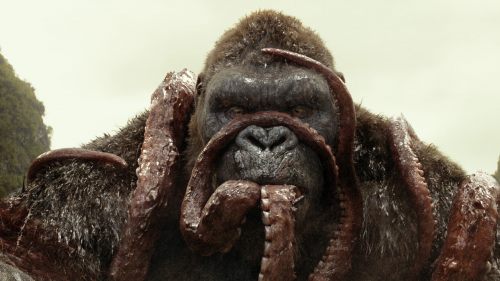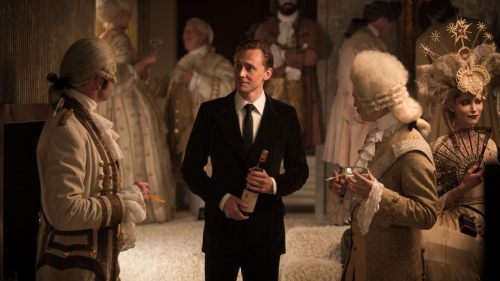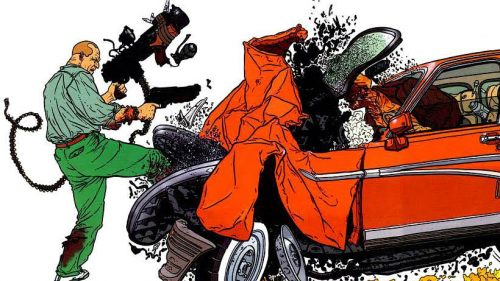Tom Hiddleston: Charm Without Cheer
Few people play the Charming Celebrity Persona Game™ better than Tom Hiddleston. He’s a font of mischievous, laid back charm, the kind of chap who alternates between teasing Muppets with the promise of baked goods, and impregnating women at late night TV tapings with a lick of his finger; if he’s feeling cheeky, he’ll do the weather, and should you ever swim into a school of jellyfish, he’ll be the first responder to your suffering, ready with a palliative urine stream to ease the sting of their merciless alien tentacles. There is no corner of the Internet where you can’t find a story about Hiddleston being suave, darling, or delightful. Admit it: You want to hang out with him. You’ve probably fantasized about what the experience would be like. We all do. We all have.
But if Hiddleston - human being, actor, bon vivant - is a walking good time in an impeccably tailored suit, the characters he gravitates toward are less so. They’re downers, pent-up basket cases, and king bummers, even the ones who cling desperately to megalomaniacal ideals, even the impetuous teenagers. Because they are played by Hiddleston, of course, they each happen to exhibit handfuls of the traits that make him who he is: They, too, are some combination of slick, dashing, impish, and refined. That’s the celebrity calibration process. Once a person establishes an image for themselves in the media, it becomes a Herculean feat for us to divorce them from that image on the big screen.
With Hiddleston, that reconciliation comes easily by virtue of his humble magnetism. But after we make odds and ends of Hiddleston and the characters he plays, we’re left with a tragic through line that extends from his earliest roles all the way up to his stint in Ben Wheatley’s High-Rise. In many ways, Hiddleston is perfect to portray Dr. Robert Laing, a quiet, well mannered sort who nurses abiding melancholy beneath his reserve. He’s polite but transparent; if he’s not in a mood for chatter, he’ll engage you with grace, but you’ll get the hint even if the hint isn’t made explicit. His grocery market inquiry regarding the whereabouts of the Riesling could easily translate to, “Piss off. I’m here for the wine.” Get enough liquor in him and he’ll make merry like everyone else, but for him revelry is a temporary distraction from ennui.
Like so many Hiddleston characters, Laing is in desperate need of something. Put in a broad context, that might be love or affection; he certainly goes out of his way to find physical love, though these moments, too, seem only to offer him a brief reprieve from what’s troubling him. Laing only appears to find peace by the time the film ends, at which point the luxury condos of the title have undergone change in management and lost an incalculable percentage of their total occupants either to tribal warfare, lack of resources, or good old fashioned revenge. It isn’t an especially pleasant place to live, but at the end of the carnage, mostly staged beyond the audience’s line of sight, he is finally able to find satisfaction of purpose in his existence.
Until then, he’s dolefully cordial, which makes him a close cousin to Sir Thomas Sharpe, the Gothic anti-hero cum tall dark-haired stranger of Guillermo del Toro’s Crimson Peak: They both present themselves with good-natured affability, but despair skulks beneath the surface of their charismatic sociability. There is more to Laing and Sharpe than can be discerned at a glance. Even for less savvy filmgoers, it’s clear that Sharpe in particular is withholding information from us, in part because del Toro wants to convey that notion exactly, and in part because Hiddleston is so preternaturally gifted at suggesting mystery (or perhaps even suppression) without actually having to suggest anything at all.
So we have two enigmatic men harboring their respective sorrows, and who, by chance, are hung up on their sisters, albeit in completely different ways. Laing’s relationship with his sister is in the past tense; in High-Rise’s present, he’s still mourning her. The relationship Sharpe has with his sister, Lucille, is taboo, in the sense that they’ve been knocking boots for years and also in the sense that they kill people on the regular to secure funds for themselves. The source of Sharpe’s sadness is less articulated than Laing’s in the text, but it’s not hard to solve that puzzle: he’s one of the last living members of an aristocratic family living in an era in which aristocratic station has decayed, and he is father to a dead child conceived with Lucille prior to the events of the film. That’s dark, “heavy metal ballad dark,” even, especially after you take the ghosts haunting his crumbling ancestral home into consideration.
Peering through Sharpe and through Laing exposes additional connective tissue linking Hiddleston’s body of work from one role to the next: family. The men Hiddleston plays are all wounded, and their varying scars and hurts generally trace back to kin. This is true whether we define “kin” by blood or by bond; Loki is plagued by genealogical imbroglios as much as Sharpe and more than Laing, for whom family is something contended with on indirect, emotional terms. For Loki, family is engaged with on physical terms, too. In Thor, he is shattered to learn that Odin isn’t his real father, that Thor isn’t his real brother, and that he is a member of a race of would-be conquerors. That reveal is his breaking point, the moment where he betrays his people and becomes a would-be conqueror himself. Every action Loki takes in his subsequent Marvel appearances, from The Avengers to Thor: The Dark World, is driven by the transformational discoveries he makes in the first Thor.
He won’t admit that his family hang-ups have had that much impact on him. Honesty and transparency are not the things that Loki is made of, though if you force him to gaze on the consequences of his actions, you might catch a brief glimpse of horror flicker across his face. He isn’t a bad bad guy, like, say, Thanos, which is not to say that he isn’t bad. He’s complicated, because family is complicative and our feelings on family tend to organize themselves in layers. Take Joanna Hogg’s 2007 feature debut, Unrelated, which she firmly orients around pricklier interactions between parents and teenage children, or Archipelago, where familial strife simmers more than it roils.
In Archipelago, Hiddleston plays Edward, a well to do fellow in the throes of quarter life crisis; he falls on the lugubrious side of the Hiddlefence, whereas Oakley, Unrelated’s teenage lothario, lands on its roguish, playful side. Oakley is out for fun and little else, but it’s made obvious very early on in Unrelated that Oakley carries a chip on his shoulder when it comes to his dear old dad, an authoritative type whose parenting style is a tacit admission of defeat. He has no idea how to handle Oakley, who doesn’t believe in marriage (a detail that speaks volumes about his character) and who habitually lies about smoking, stealing bottles of expensive wine, and wrecking the rental car. By consequence of neglect, Oakley thinks his dad doesn’t give a fuck about him. The knock-down, drag-out fight they have near the film’s third act suggests that they both give a fuck, but they’re incapable of constructive expression.
Oakley wants his dad to be a dad. He wants to know that someone cares. If you ignore that whole “Norse God” thing, he’s not all that different from Loki, though truthfully he shares more in common with Freddie Page, the volatile war vet of Terence Davies’ The Deep Blue Sea. Freddie is a prototypical Hiddlestonian party boy. He’s quick with a joke. He’s often seen holding a drink. The smirk at the corners of his lips suggests he’s about to tell a joke, break into song, or perform a skit. All is well and good with Freddie until you lecture him about Cubism, and then he turns into David Duchovny on SNL; or until you try to have a serious conversation with him regarding your feelings, at which point he turns into something less comical and more vicious.
Freddie isn’t “sad” specifically, but he is shaped by a core of trauma. You’re better off describing the devil in him as depressive, a term that applies just as well to Adam, the despondent, suicidal male lead in Only Lovers Left Alive. A vampire aged in centuries, Adam’s only real family is his wife, Eve, who at the start of the film is halfway around the globe; he lives by himself in a rundown Detroit Victorian, his isolation broken only by Ian, who works for Adam as a courier, fetching him vintage guitars and assorted exotica for cash. You might expect that Adam’s gloom is symptomatic of his loneliness. You’d be wrong. Adam is in the doldrums because modernity is shit. It’s the “zombies,” he’ll say, the living meat bags who show their appreciation for Earth by spoiling it.
But Adam’s misery is surprisingly relatable. It’s normal, as you grow older, to see the young as grating and tasteless, and to see the stuff they like as straight-up garbage. He isn’t concerned with the state of the planet. He’s bored (or perhaps baffled or offended) by the generations who have inherited the planet in succession throughout his lifetime. He has no stomach for them, or what he sees as humanity’s rejection of genius. That, combined with the figurative hole in his heart left by Eve’s absence, is enough to make him seriously consider putting a literal hole in his heart with a wooden bullet. Basically, he’s a real mope, which is either contrary to or exactly what you’d assume an ancient rock and roll vampire would be like.
And that’s just Hiddleston’s way. He oozes cool; he exudes sophistication. He’s funny, too, and he doesn’t have to be. He could, in all likelihood, get by without clowning around thanks to his unfailing stylishness and cultivated exterior. That he chooses not to - that he rarely misses a good comedy set-up - says a lot about the kind of actor he is - as much, in fact, as the roles he is drawn to. Just as he probably doesn’t need to play the goof on late night, he probably doesn’t need to play men aggrieved of the world they inhabit. He could make a career playing rakish smooth talkers or straightlaced do-gooders. That he doesn’t is telling. Maybe Hiddleston, like so many of the characters he has earned recognition playing, is in search of something unknown, and maybe the Sharpes, the Laings, the Oakleys, the Lokis of his oeuvre are his map to finding it.



